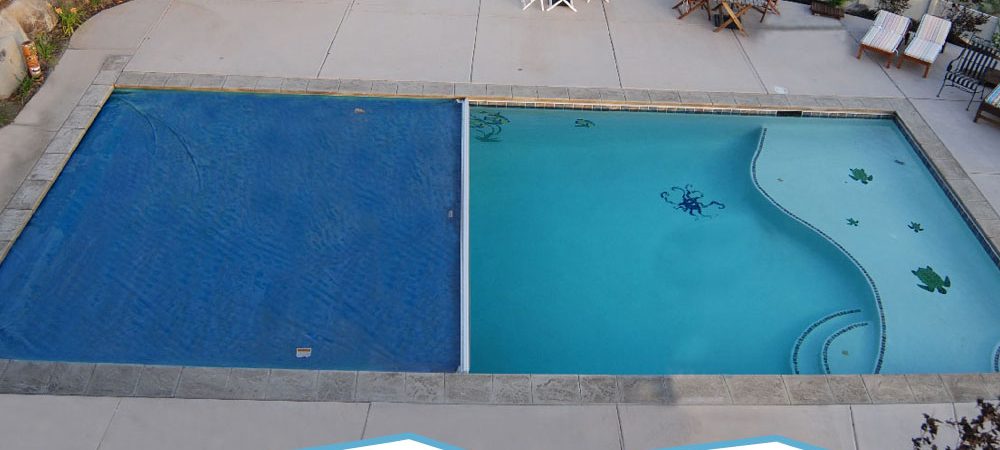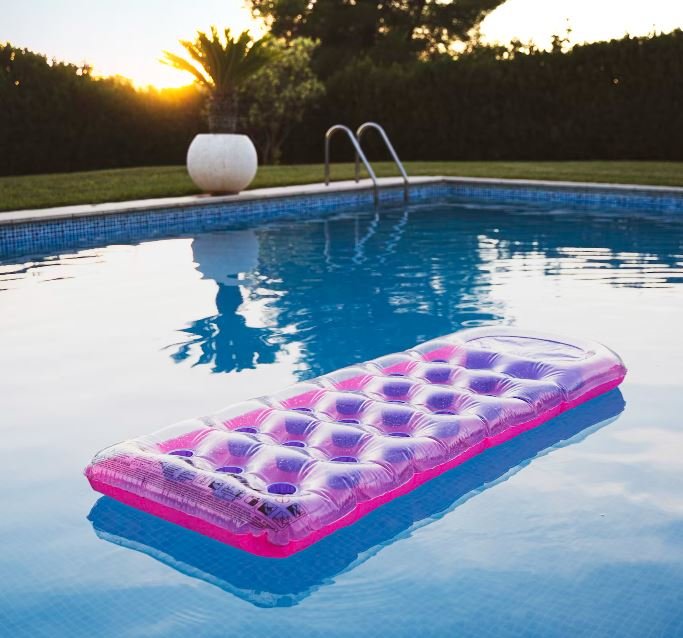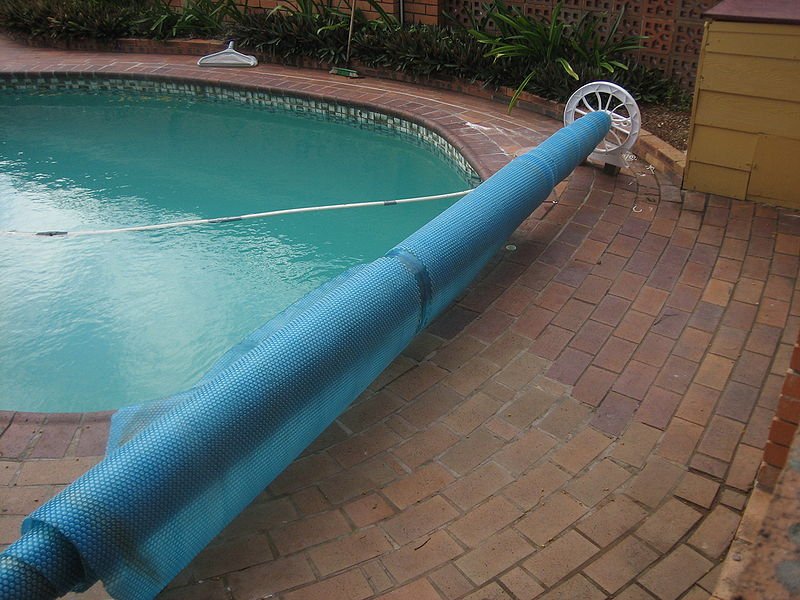
Pool covers are often underestimated but are important for maintaining a clean, safe, and energy-efficient pool. They serve as a shield against various elements, ensuring your pool remains in pristine condition. The best thing about high-quality pool covers is that they extend your pool’s lifespan and even save you money in the long run.
We’ll cover everything from different types of pool covers taking into consideration sizing, installation, maintenance, and benefits. By the end of this guide, you’ll be well-equipped to make an informed decision that safeguards your pool and enhances your overall pool experience.
Let’s help you select the right pool cover for your specific needs.
Types of Pool Covers
Solar Covers (Bubble Covers)
Solar covers, also commonly referred to as bubble covers, serve a dual purpose – they reduce water evaporation and heat your pool. These covers consist of a series of air bubbles that trap and transfer the sun’s heat to the pool water. The bubbles are typically transparent, resembling bubble wrap.
One of their primary advantages is their ability to significantly reduce water evaporation, which conserves water and reduces the need for frequent refilling. Solar covers can also raise your pool’s water temperature by several degrees, extending the swimming season.
Winter Covers
Winter covers are designed to protect your pool during the colder months when it’s not in use. These covers are typically made of heavy-duty, UV-resistant fabric or solid vinyl material. They serve as a barrier against harsh winter weather, such as ice and snow, keeping your pool safe and preserving its structure.
Winter covers also prevent debris, such as leaves and branches, from entering the pool, which reduces the time and effort required for spring cleanup.
Safety Covers
Safety covers are engineered to provide protection and security for your pool. These covers are typically made of durable mesh or solid materials and are anchored securely to the pool’s deck. Their design adheres to high safety standards, making it incredibly difficult for children and pets to access the pool area unsupervised. There are two different ways to operate a vinyl safety cover…Automatic and Manual.
Mesh Covers
Mesh covers are excellent for pool owners who want to keep debris out while allowing rainwater to pass through. They are made from a porous mesh material that effectively blocks leaves and larger debris from contaminating your pool.
Mesh covers are favored for their ease of installation and removal, and they typically do not require water bags or weights to stay in place.
Benefits of Using Pool Covers
Pool covers are a practical addition to any swimming pool, offering a wide range of benefits that enhance safety, maintenance, and cost-efficiency. Here are the key advantages of using pool covers:
1. Water Conservation
One of the most significant benefits of using pool covers is their ability to reduce water evaporation. This not only conserves water but also decreases the need for frequent refilling, which can lead to significant water savings, particularly in arid regions.
2. Energy Savings
Pool covers provide insulation for your pool, reducing heat loss and the need for constant heating. This, in turn, leads to substantial energy savings and reduced utility bills, making your pool more environmentally friendly and cost-effective.
3. Enhanced Safety
Safety covers are designed to provide a secure barrier, preventing accidental entry into the pool. They are important for families with young children or pets, offering peace of mind and ensuring a safe pool environment.
4. Reduced Maintenance
Pool covers act as a protective shield, preventing debris like leaves, twigs, insects, and dirt from falling into the pool. This not only keeps your pool cleaner but also reduces the time and effort required for regular maintenance and cleaning.
5. Cleaner Water
By keeping out debris, pool covers help maintain water quality. This means you’ll spend less time and money on chemicals and filtration, ensuring your pool water remains crystal clear and inviting.
6. Extended Swimming Season
Solar pool covers, also known as bubble covers, can raise the temperature of your pool water by several degrees. This allows you to start your swimming season earlier in the spring and extend it later into the fall.
7. Reduction in Chemical Usage
With less debris and sunlight exposure, your pool’s chemical balance remains more stable. This reduces the need for chemical adjustments, ultimately saving you money and improving water quality.
8. Environmental Benefits
Solar covers make use of the sun’s energy to heat your pool, reducing the need for conventional energy sources and decreasing your carbon footprint. They are an eco-friendly choice for environmentally-conscious pool owners.
9. Protection Against Harsh Weather
Winter covers shield your pool from the harsh elements of winter, preventing damage from freezing temperatures, ice, and snow. This can extend the life of your pool and its equipment.
10. Cost Savings
While there is an initial investment in purchasing and installing a pool cover, the long-term cost savings in water, energy, chemicals, and maintenance make it a financially wise decision.
11. Prevents Algae Growth
Mesh covers, which allow rainwater to pass through while blocking debris, can help prevent algae growth by eliminating stagnant water on the pool’s surface.
12. Safety Regulations Compliance
Safety covers are often required by local regulations in areas where pools are present. Using an approved safety cover ensures compliance with these regulations.
13. Aesthetics
Some pool covers can enhance the overall appearance of your pool area, contributing to its aesthetic appeal and creating a clean and tidy outdoor space.
Factors to Consider When Choosing a Pool Cover

Type of Pool
Consider whether you have an in-ground or above-ground pool, as the type of pool cover you choose should be compatible with your pool’s design.
Climate and Seasonal Use
Evaluate your local climate and how you intend to use your pool. Different pool covers are designed for specific seasons and weather conditions. For example, if you live in a region with harsh winters, a durable winter cover is essential to protect your pool from freezing temperatures and snow.
Safety Requirements
If you have children or pets, safety is not to be ignored. In such cases, opt for a safety cover designed to prevent accidental entry into the pool. In some areas, these covers are often required by law to ensure child safety.
Debris Protection
Assess the level of debris that falls into your pool area. If your pool is surrounded by trees, a cover that provides effective debris protection is important to reduce the time and effort spent on pool maintenance.
Pool Size and Shape
Accurately measure your pool’s dimensions, including its size and shape. The pool cover you choose must fit snugly to provide proper coverage.
Ease of Installation and Use
Consider a cover that’s easy to install and operate. Some covers, like automatic ones, are more convenient but come at a higher cost, while others, such as manual covers, require more manual effort.
Budget
Determine your budget for a pool cover. Costs can vary significantly depending on the type and quality of the cover, as well as installation expenses.
Maintenance Requirements
Different pool covers have varying maintenance needs. Some require periodic cleaning and storage, while others may need professional maintenance or repairs.
Long-Term Savings
Look beyond the initial cost of the pool cover and consider its long-term savings potential. For example, covers that reduce water evaporation and heat loss can save on water and energy costs over time.
Environmental Impact
Assess the environmental impact of your pool cover choice. Solar covers, for example, can reduce energy consumption by using the sun’s heat to warm the water, which is environmentally friendly.
Durability and Lifespan
Investigate the expected lifespan of the pool cover. While some covers are more durable and can last for many seasons, others may need replacement sooner.
Local Regulations and Codes
Check with local authorities and pool safety regulations in your area. Some locations may have specific requirements for pool covers, especially when it comes to safety standards.
Aesthetics
Consider the visual aspect of your pool cover. Some covers can be more aesthetically pleasing and blend seamlessly with your pool area, while others may have a more utilitarian appearance.
Brand and Manufacturer
Research reputable brands and manufacturers. Choose a trusted company that offers quality materials, warranties, and customer support.
Conclusion
Selecting the right pool cover is a crucial decision that can greatly impact your swimming pool’s overall experience, safety, and maintenance. Each type of pool cover offers advantages and limitations, and your choice should be purely based on your unique needs, climate, and preferences.
Whether you’re looking to keep your pool water warm, protect it from debris, or ensure the safety of your loved ones, there’s a pool cover designed to meet your requirements. Safety covers are ideal for families with children and pets, while winter covers shield your pool during the off-season. Solar covers help reduce water evaporation and heating costs, and mesh covers allow water to pass through, preventing algae growth.
So, take your time, explore your options, and make the best choice for your specific pool needs.











